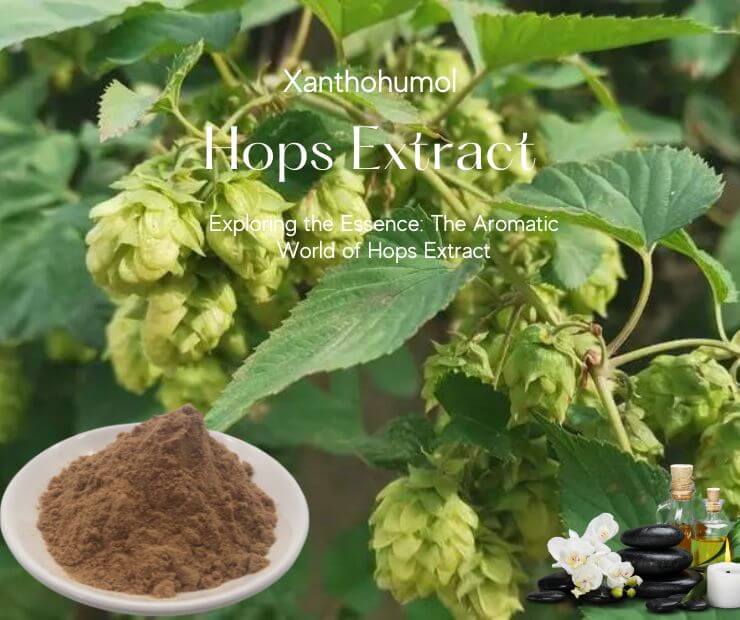Unveiling the Wonders and Uses of Hops Extract in Brewing and Beyond
In the vast realm of brewing and herbal extracts, one ingredient stands out for its distinctive aroma and flavor – hops. While hops are commonly known for their role in beer production, their concentrated form, hops extract, opens up a world of possibilities beyond the brewing kettle. Join us on a journey as we delve into the fascinating world of hop extract, exploring its origins, characteristics, and diverse applications.
What is Hops Extract?
Hops extract is a concentrated form of the hop plant (Humulus lupulus) that is obtained through various extraction methods. These methods can include solvent extraction, supercritical fluid extraction, or even steam distillation, each resulting in a potent substance that captures the essence of hops.
The Aroma Symphony: Understanding Hops Profiles
One of the most intriguing aspects of hop extract is its aromatic profile. Hops contribute a wide range of flavors and aromas, from citrusy and floral to piney and spicy. The extract allows brewers and artisans to precisely control and enhance these characteristics, leading to a more nuanced and customized final product.
Brewing Magic: Hops Extract in the Beer World
While traditional hop cones have been a staple in brewing for centuries, the use of hop extract has gained popularity among craft brewers seeking consistency and precision. Brewers can experiment with different hop varieties and create unique flavor profiles without the bulk and potential inconsistencies associated with whole hop cones.
Beyond Beer: Culinary and Medicinal Applications
Hops extract isn’t confined to the brewing world. Its distinct flavor and aroma make it a valuable ingredient in the culinary realm. From adding a hoppy twist to sauces and marinades to infusing desserts with a subtle bitterness, chefs are discovering the versatility of hop extract. Moreover, hops are known for their potential calming properties, and the extract is finding its way into herbal remedies and aromatherapy products.
The Future of Hops Extract:
Innovations and Trends As the appreciation for craft beverages and unique flavors continues to grow, the demand for hops extract is expected to rise. Innovations in extraction technologies and sustainable farming practices are likely to shape the future of this aromatic extract. Whether it’s creating the perfect beer or crafting culinary delights, hops extract is set to play a pivotal role in the evolving world of flavors.
Hops extract contains a variety of active ingredients that contribute to its flavor, aroma, and potential health benefits.
- Alpha and Beta Acids:
Hops contain alpha and beta acids, which are bitter compounds. These acids have antimicrobial properties and are used in traditional medicine for their potential to alleviate inflammation. Additionally, they play a crucial role in beer brewing, providing bitterness and acting as natural preservatives.
- Essential Oils:
The essential oils in hops, such as humulene and myrcene, contribute to the characteristic aroma. These oils have potential anti-inflammatory, antioxidant, and sedative properties. Some studies suggest that they may have applications in herbal medicine for their calming effects.
- Flavonoids:
Flavonoids are a group of polyphenolic compounds found in hops. They exhibit antioxidant properties and may have anti-cancer, anti-inflammatory, and cardiovascular benefits. Research is ongoing to explore the potential health effects of these compounds.
- Xanthohumol:
Xanthohumol is a prenylated chalcone found in hops and is known for its antioxidant and anti-inflammatory properties. It has garnered attention for its potential role in cancer prevention, as studies have suggested its anti-cancer properties. Additionally, xanthohumol has been investigated for its impact on metabolic health.
- Lupulin:
Lupulin is a glandular powder found in the hop cone, containing the resinous compounds responsible for the bitterness and aroma in hops. It is a source of various active components, including alpha and beta acids, essential oils, and polyphenols. Lupulin has potential applications in herbal medicine due to its diverse array of bioactive compounds.
- Bitter Acids (e.g., Humulone, Cohumulone):
Bitter acids contribute to the bitterness of hops and are important in brewing. Some research suggests that these acids may have anti-inflammatory properties and could be explored for potential therapeutic applications.
- Polyphenols:
Polyphenols, including tannins, are present in hops and are known for their antioxidant properties. They may have applications in promoting cardiovascular health and reducing oxidative stress in the body.
Conclusion:
In essence, hops extract is more than just a brewing ingredient – it’s a versatile and aromatic powerhouse with applications that extend far beyond the beer glass. As we continue to explore the boundaries of flavor, hops extract stands as a testament to the art and science of extracting nature’s essence. Whether you’re a brewmaster, a chef, or simply a flavor enthusiast, hops extract invites you to unlock a world of possibilities and savor the essence of this remarkable plant.








